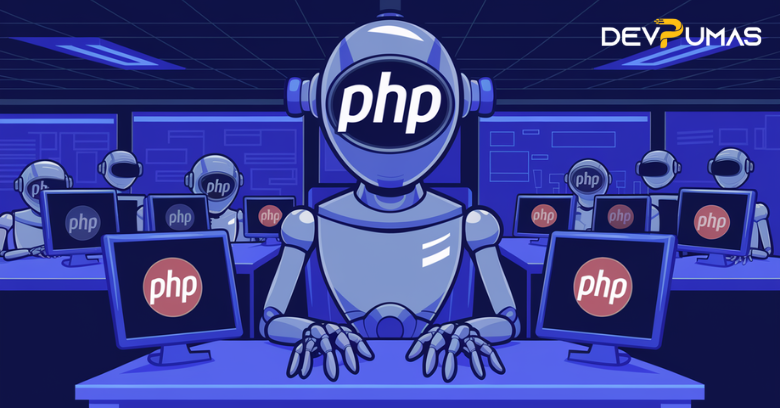Introduction
Despite the rise of modern programming languages and frameworks, PHP powers 75% of the web in 2024, continuing to be the backbone of some of the most popular websites, including Facebook, Wikipedia, and WordPress. PHP’s resilience is a testament to its unmatched versatility, simplicity, and widespread adoption. Whether it’s a small blog or a large-scale e-commerce platform, PHP has consistently adapted to meet the needs of developers worldwide.
In this article, we’ll explore why PHP continues to dominate the web, its advantages, its relevance in modern development, and its role in shaping the internet landscape.
A Brief History of PHP
PHP, or Hypertext Preprocessor, was introduced in 1994 by Rasmus Lerdorf as a simple scripting language for building dynamic web pages. Over the years, PHP evolved into a full-fledged server-side programming language with widespread adoption.
From PHP 3’s introduction of extensible modules to PHP 7’s performance optimization and PHP 8’s modern features like JIT (Just-In-Time) compilation, the language has constantly evolved to keep pace with the changing web development landscape.
Why PHP Powers 75% of the Web
1. Ease of Use
PHP’s syntax is beginner-friendly, making it an ideal choice for new developers. Its simplicity allows developers to quickly set up web servers and create dynamic pages without a steep learning curve.
Example:
<?php
echo "Hello, World!";
?>
This simplicity has made PHP a go-to language for small businesses and individual developers creating websites.
2. Compatibility with Web Servers and Databases
One of the reasons PHP powers 75% of the web is its compatibility with nearly all web servers, including Apache, Nginx, and IIS. Additionally, PHP integrates seamlessly with popular databases like MySQL, PostgreSQL, and SQLite.
This flexibility allows developers to create web applications that are easy to deploy and run across different environments.
3. Extensive Frameworks and CMS Ecosystem
PHP boasts a rich ecosystem of frameworks and content management systems (CMS) that simplify development tasks.
Popular PHP Frameworks:
- Laravel: Offers elegant syntax and tools for building complex web applications.
- Symfony: Provides reusable PHP components for rapid development.
- CodeIgniter: Lightweight and ideal for small-scale projects.
Content Management Systems:
- WordPress: Powers over 40% of websites globally.
- Drupal: Offers robust solutions for enterprise-level content management.
- Joomla: A user-friendly CMS for small to medium-sized businesses.
These tools have significantly contributed to PHP’s dominance in web development.
4. Performance Improvements
With the release of PHP 7 and PHP 8, the language has seen significant performance enhancements. PHP 7 introduced a new Zend Engine that doubled the execution speed of PHP code, while PHP 8’s JIT compilation further optimized performance for computational tasks.
Benchmark Example:
PHP 7 can handle twice as many requests per second compared to PHP 5, making it suitable for high-traffic websites and real-time applications.
5. Cost-Effectiveness
PHP is open-source, meaning developers can use it for free without worrying about licensing fees. Additionally, the availability of free tools, libraries, and frameworks reduces development costs, making it an attractive choice for businesses of all sizes.
6. Large Developer Community
PHP has one of the largest and most active developer communities. This ensures abundant resources, tutorials, and support for developers at all levels. The community-driven nature of PHP also results in continuous updates and innovations that keep the language relevant.
Challenges Facing PHP
Despite its popularity, PHP faces criticism for being less secure or modern than newer languages. Some of the challenges include:
- Security Concerns: Poorly written PHP code can be vulnerable to security threats. However, frameworks like Laravel have built-in security features to mitigate risks.
- Competition from Modern Languages: JavaScript (Node.js), Python, and Ruby offer modern alternatives for web development.
- Legacy Code Maintenance: Many older PHP projects lack proper documentation, making them difficult to maintain.
However, these challenges are addressed through best practices, modern frameworks, and community support.
PHP in Modern Web Development
1. Role in E-Commerce
PHP remains a cornerstone of e-commerce development due to its compatibility with platforms like Magento, WooCommerce, and OpenCart. These platforms enable businesses to build scalable and customizable online stores.
2. Integration with Modern Technologies
PHP integrates seamlessly with APIs, cloud services, and microservices architecture, making it adaptable for modern web development. Developers can use PHP alongside technologies like REST, GraphQL, and Docker.
3. Serverless PHP
The rise of serverless architecture has extended PHP’s capabilities. Platforms like AWS Lambda now support PHP, enabling developers to build scalable, serverless applications.
Real-World Examples
- Facebook: Originally built with PHP, Facebook developed its PHP-based runtime, HHVM, to enhance performance.
- Wikipedia: One of the largest online encyclopedias uses PHP for its speed and reliability.
- WordPress: Over 40% of websites worldwide run on WordPress, powered by PHP.
Why PHP is Here to Stay
PHP’s longevity can be attributed to its adaptability, robust ecosystem, and ability to meet the needs of both small-scale projects and large-scale applications. The language continues to evolve, with modern frameworks and updates ensuring its relevance in an ever-changing tech landscape.
As new technologies emerge, PHP’s compatibility, cost-effectiveness, and ease of use make it a reliable choice for businesses and developers alike.
Takeaway
In 2024, PHP powers 75% of the web due to its simplicity, performance, and versatility. While newer languages and frameworks have emerged, PHP remains indispensable for web development. Its extensive frameworks, robust community support, and compatibility with modern technologies make it a cornerstone of the internet’s infrastructure.
Whether you’re building a small blog or a complex enterprise application, PHP offers the tools and flexibility needed to succeed in web development.



